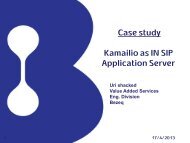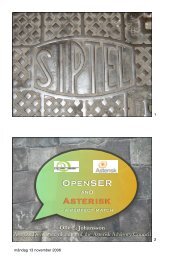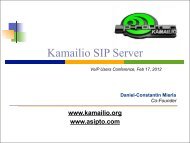Stefan Wintermeyer stefan.wintermeyer@amooma.de ... - Kamailio
Stefan Wintermeyer stefan.wintermeyer@amooma.de ... - Kamailio
Stefan Wintermeyer stefan.wintermeyer@amooma.de ... - Kamailio
Create successful ePaper yourself
Turn your PDF publications into a flip-book with our unique Google optimized e-Paper software.
Gemeinschaft 4<br />
<strong>Stefan</strong> <strong>Wintermeyer</strong><br />
<strong>stefan</strong>.<strong>wintermeyer@amooma</strong>.<strong>de</strong> - Twitter: @wintermeyer
What is Gemeinschaft?
Gemeinschaft 4 is a FreeSWITCH<br />
and <strong>Kamailio</strong> based PBX.
Boring!
I will not bore you with<br />
PBX features.<br />
I will talk about the<br />
security of a SIP-PBX.
History of<br />
Gemeinschaft
• Version 1.0 was released in 2006<br />
• Version 3.1 consists of 160.000 LOC<br />
• 4 Fulltime-Developer<br />
• GPL
Gemeinschaft 1.0 - 3.x<br />
• Asterisk<br />
• PHP<br />
• Apache<br />
• Linux<br />
• DHCP-Server<br />
• ...
The Community<br />
Gemeinschaft is GPL.
~700
~200
github.com/amooma/GemeinschaftPBX
In 2010 the German<br />
BSI started a request<br />
for proposal for an<br />
open-source PBX<br />
which is secure.
Wikipedia:<br />
„The Bun<strong>de</strong>samt für Sicherheit in <strong>de</strong>r<br />
Informationstechnik (abbreviated BSI -<br />
in English: Fe<strong>de</strong>ral Office for Information<br />
Security) is the German government<br />
agency in charge of managing computer<br />
and communication security for the<br />
German government.“
The BSI is very<br />
paranoid!
We got the contract<br />
from the BSI and got<br />
the chance to create a<br />
real secure PBX system<br />
for normal companies<br />
and gov. institutions.
We set up 6 major goals<br />
for Gemeinschaft 4.
1<br />
SIP-PBXs are hacked<br />
every day by script<br />
kiddies.<br />
It became very easy.<br />
Let‘s stop that!
2<br />
It has become easy to<br />
attack a company‘s<br />
PBX with a SIP DOS<br />
attack.<br />
Let‘s stop that!
3<br />
Most calls don‘t need<br />
encryption but let‘s<br />
make encryption<br />
optional and easy to<br />
use.
4<br />
After stealing your<br />
PBX harddrive anyone<br />
can analyse very<br />
interesting stuff.<br />
Let‘s make that<br />
impossible!
5<br />
TDD<br />
Test-Driven-<br />
Development
6<br />
It has to be easy to<br />
install!
Gemeinschaft 4 is a PBX<br />
which can be used in an<br />
embassy AND a small<br />
company.
We couldn‘t achieve<br />
these goals with our<br />
old Asterisk based<br />
version.<br />
We had to start on the<br />
green field!
Minimal System<br />
Requirements<br />
• 2 GB Harddrive<br />
• 1 GB RAM<br />
• CPU of your choice (~> Atom)<br />
BTW: Gemeinschaft 4 (FreeSWITCH + <strong>Kamailio</strong>) runs circles around Gemeinschaft 3 (Asterisk).
Gemeinschaft 4.0<br />
• FreeSWITCH<br />
• <strong>Kamailio</strong><br />
• Ruby on Rails<br />
• Linux<br />
• DHCP-Server<br />
• ...
Gemeinschaft 3.1<br />
Touchdown: Q4 2011<br />
Gemeinschaft 4.0<br />
http://twitter.com/GemeinschaftPBX
Architecture of<br />
Gemeinschaft 4
Database<br />
FreeSWITCH<br />
SIP<br />
<strong>Kamailio</strong><br />
SIP<br />
SIP-Trunk / PSTN<br />
SIP<br />
HTTPS<br />
HTML Browser<br />
HTTPS<br />
REST-API 3rd party<br />
Provisioning
Gemeinschaft 4<br />
FreeSwitch<br />
(Media Server, VM, Conf.)<br />
<strong>Kamailio</strong><br />
(Proxy, Registrar)<br />
Database<br />
IPTables (Shorewall) + AppArmor<br />
Web-Application<br />
(Provisioning, GUI, API)
Gemeinschaft 4<br />
FreeSwitch<br />
(Media Server, VM, Conf.)<br />
<strong>Kamailio</strong><br />
(Proxy, Registrar)<br />
Database<br />
IPTables (Shorewall)<br />
IPTables: Web-Applikation First line<br />
(Provisioning, GUI, API)<br />
of <strong>de</strong>fence
Gemeinschaft 4<br />
FreeSwitch<br />
(Media Server, VM, Conf.)<br />
<strong>Kamailio</strong><br />
(Proxy, Registrar)<br />
Database<br />
AppArmor:<br />
Just in case<br />
someone finds a<br />
Web-Applikation<br />
hole (Provisioning, we‘ll make GUI, API) sure<br />
no harm is done.<br />
AppArmor
Gemeinschaft 4<br />
FreeSwitch<br />
(Media Server, VM, Conf.)<br />
<strong>Kamailio</strong><br />
(Proxy, Registrar)<br />
Database<br />
IPTables (per Shorewall)<br />
Defenceline at the<br />
SIP-Level<br />
Web-Applikation<br />
mod-ratelimit<br />
(Provisioning, GUI, API)<br />
mod-sanity<br />
mod-auth<br />
…
Gemeinschaft 4<br />
FreeSwitch<br />
(Media Server, VM, Conf.)<br />
<strong>Kamailio</strong><br />
(Proxy, Registrar)<br />
Database<br />
IPTables (per Shorewall)<br />
Media-Server:<br />
- Voicemail<br />
- Conferencing<br />
- IVR<br />
Web-Applikation<br />
(Provisioning, GUI, API)<br />
- Transcoding
hmm... let‘s add some<br />
more security ...
Most admins don‘t<br />
have an i<strong>de</strong>a about<br />
the danger. Because of<br />
that they are unable<br />
to har<strong>de</strong>n their<br />
system.
The solution is a<br />
good-to-go Live-File-<br />
System on CD-ROM.
Gemeinschaft 4 ISO<br />
• Based on Knoppix-Linux (Debian)<br />
• Read-Only filesystem for the system itself<br />
• Storing the configuration, faxes and<br />
voicemails on seperate partitions.<br />
• Absolut minimum Linux installation<br />
• No login shells, no ssh, not even an editor<br />
What we don‘t need we don‘t install.
Boot Options<br />
• CD-ROM<br />
• USB-Stick<br />
• Harddrive (the ISO file is copied to the<br />
harddrive as an ISO image)
But what about the<br />
sensitive data?
We encrypt the whole<br />
partion.
Faxes and Voicemail<br />
Database<br />
2 GB Harddrive<br />
3rd Partion<br />
4th Partion<br />
2nd Partion<br />
1st Partition<br />
Current ISO<br />
Last ISO
Faxes and Voicemail<br />
20 GB Harddrive<br />
4th Partion<br />
Current ISO<br />
1st Partition<br />
2nd Partion<br />
3rd Partion<br />
Last ISO<br />
Database
What about the<br />
phone calls?
We use SRTP + ZRTP<br />
to encrypt calls.
What about<br />
configuration of the<br />
phones?
The phones only<br />
accept HTTPS<br />
provisioning files from<br />
our server.<br />
It took forever to make this running foolproof.
But what about the<br />
analog and ISDN-cards<br />
from Sangoma and<br />
Digium?
We don‘t support<br />
them. Only SIP calls!
Why did we jump<br />
through all these hoops?
Our clients don‘t know<br />
better but we do.
Current popular SIP<br />
PBXes make it too easy<br />
for attackers.<br />
That‘s going to backfire!
<strong>stefan</strong>.<strong>wintermeyer@amooma</strong>.<strong>de</strong><br />
Questions?
http://twitter.com/GemeinschaftPBX<br />
<strong>stefan</strong>.<strong>wintermeyer@amooma</strong>.<strong>de</strong>

















